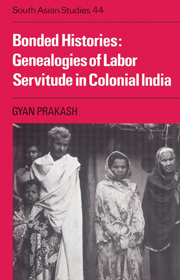Book contents
- Frontmatter
- Contents
- List of illustrations
- List of tables
- Preface
- Conventions followed in the text
- List of abbreviations
- Introduction: the discourse of freedom
- 1 Places of bondage
- 2 True stories
- 3 Land is to objectify
- 4 Freedom found and lost
- 5 Contested power
- Conclusion: freedom bound
- Appendix
- Glossary
- Bibliography
- Index
- CAMBRIDGE SOUTH ASIAN STUDIES
4 - Freedom found and lost
Published online by Cambridge University Press: 22 September 2009
- Frontmatter
- Contents
- List of illustrations
- List of tables
- Preface
- Conventions followed in the text
- List of abbreviations
- Introduction: the discourse of freedom
- 1 Places of bondage
- 2 True stories
- 3 Land is to objectify
- 4 Freedom found and lost
- 5 Contested power
- Conclusion: freedom bound
- Appendix
- Glossary
- Bibliography
- Index
- CAMBRIDGE SOUTH ASIAN STUDIES
Summary
The great author of creation, matter, motion, and existence made all men equally free. By what act then can that freedom be forfeited or given up?
J. Richardson, Joint Magistrate, Bundelkhand, 1808.… voluntary contracts of hire and service… whether the contract be for a limited period or for life, and whether the stipulated hire for service be wages or maintenance, such contracts are not deemed incompatible with the principles of justice and the laws of England…and by sanctioning them, it may be expected that the Hindoo practice of voluntary subjection to slavery, in times of famine and scarcity, will be converted into a condition more favourable to the servant and his family.
J. H. Harington, Judge, Sudder Dewanny and Nizamut Adawlut, 1818.As agrarian relations were objectified in land, the kamias were subjected to a variety of practices that defined and documented them as persons who had lost their natural rights to freedom because of the innate power of money, grain, and land that they received from the maliks. Through the juridical representation of debt-bondage, the power of things enveloped the kamias into an economy of suspended rights, and turned them into bonded laborers. This development was emblematic of a profound historical transformation that first established freedom as the essence of humanity and then denied it to the kamias. The violence done to the kamias in this process did not originate in the translation of an indigenous term into English.
- Type
- Chapter
- Information
- Bonded HistoriesGenealogies of Labor Servitude in Colonial India, pp. 140 - 183Publisher: Cambridge University PressPrint publication year: 1990



